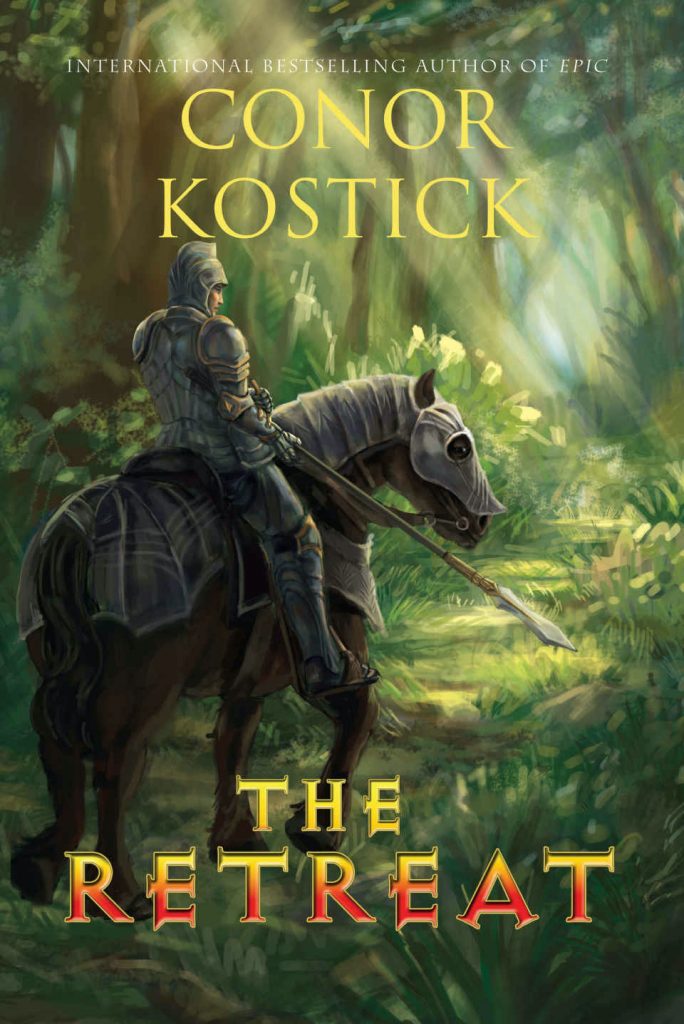
The Retreat
by Conor Kostick | Red Stag | 271pp | €14.99 (9781912514564)| Also available as eBook here.
Review by Oisín McGann
There is very little of the romantic image of medieval knights in the latest novel from Conor Kostick. When Guibert of Rocadamour, an inexperienced young knight, joins Duke Shalk’s expedition to the Holy Land, he dreams of becoming a legendary hero, the type of warrior that people sing songs about. As well as the professional soldiers, the mass of travellers includes people from every level of society. Many are there to serve the army. Others are simply tagging along in relative safety to pursue their own goals. Shalk’s army is a very mixed group; some are seeking divine favour, some hoping for glory in battle, while some just dream of a better life in a new place. Some intend to pillage the wealth they’ve heard stories of from those who returned from the crusades.
We join the expedition long before it can reach the Holy Land, after an impulsive attack on a city in Hungary. Having fallen foul of Hungary’s ruler, the crusaders are given a stark choice: surrender their weapons, leave the city and be allowed to continue on in peace, or face the full force of the king’s army.
After a series of skirmishes and disasters, and with their leader killed, Guibert is one of smaller column of survivors forced to give up hope of continuing their journey. Every level of social status, from the noble Count Stephen to the lowliest, savage mutur, is now unified to achieve a single goal: get home alive.
Kostick’s background as a historian informs the authenticity and detail of the story, from the small personal habits of the characters to the wider European setting. As the column makes its way along a Roman road through the menacing shadows of a German forest, Guibert finds himself one of the de facto leaders of the group, and, as factions form, he struggles not to take sides. If there’s a weakness in the story for me, it’s the young knight’s open-mindedness and how quickly he accepts that social ranks are no longer as important as they once were. There is a key scene near the start where he has to make decision to disobey his duke based on the judgement of Gerald, a common soldier, though one who has extensive battle experience and is respected as commander. For Guibert, that first act is an instinctive one to exercise his independence from the soldier who’s been sent to nursemaid him, but after this, he seems to readily accept the advice of Gerald and even that of Rainulf, leader of the mutur, the lowest class of commoners and social outcasts. He even listens to the advice of Gerald’s wife, Melinde, and Cateline, the woman he enlists to help tend his wounded sergeant and with whom he begins to develop a comforting but uncertain relationship. While he sees the possibility of it being permanent, she does not. This growing blindness to social rank is a part of his character arc that curves very quickly, and I wonder if this feels the case because of my own perception of medieval class structures and sexism, or if Guibert’s behaviour is not as exceptional as I’ve been led to believe. But, then, I am not a historian.
While it is very much Guibert’s story, the column as a whole faces one challenge after another, and the people’s attention turns increasingly to the treasure stolen from the sacked city, which now weighs them down as they struggle to make their way along the old road through hostile territory. It is jealously guarded by the mutur. This tension is well captured in the conflicts between the leaders, all very distinct characters with different motives, and in the misery and frustration of the farm workers, tradespeople and religious zealots who now form the majority of this mixed mob. These are conflicts that Guibert finds himself negotiating as the story explores themes of greed, social status, cooperation and the steady descent of moral certainty in the face of violence, betrayal and desperation. As we follow the column down that dark forested road, the story holds us, making us wonder how much of Guibert’s nobility will survive the journey.
***
Review by Oisín McGann
@OisinMcGann












